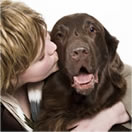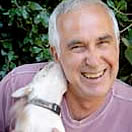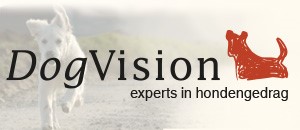 De mythe van de alphahond
De mythe van de alphahond
Als je hond als eerste door de deur gaat of als hij op de bank gaat liggen, dan is hij dominant en wil hij leider van de roedel worden. Laat je hond nóóit als eerste eten, want dan gaat hij denken dat hij aan de top van de hiërarchie staat. Dit soort uitspraken worden nog veel gebezigd in hondenland en niets is minder waar. De hond wil als eerste naar buiten, omdat hij ongeduldig is en graag wil wandelen. Een bank is comfortabeler dan een harde vloer!
De alphatheorie gebruiken als uitgangspunt bij hondentraining is achterhaalt en niet nodig. Om een goede relatie met je hond op te bouwen dien je als een vader of moeder voor je hond te zijn, iemand die de hond begeleidt en helpt. Het is niet nodig om een hond te onderdrukken met correcties uit angst dat hij je zal gaan overmeesteren. Maar hoe zit het dan precies met die dominantie? Bestaan er dominante honden?
Een vierluik: experts aan het woord
Doggo.nl heeft 4 hondenprofessionals van divers pluimage gevraagd naar hun visie op het dominantiemodel. Iedere expert legt uit hoe hij/zij denkt over alphadominantie en hoe jij als hondeneigenaar met je hond zou moeten omgaan.
Arjen van Alphen

Arjen van Alphen is een Nederlandse gedrags-deskundige en (sociaal) weten-schapper en doet onderzoek naar hondengedrag en ontwikkelde samen met Francien Koeman De Roedelmethode®
Lees deel 1 van 4
Monique Bladder
 Monique Bladder is kynologisch gedragstherapeut en rondt dit jaar de post-graduaatopleiding Toegepast Diergedrag af. Ze geeft door het hele land regelmatig lezingen over dominantie.
Monique Bladder is kynologisch gedragstherapeut en rondt dit jaar de post-graduaatopleiding Toegepast Diergedrag af. Ze geeft door het hele land regelmatig lezingen over dominantie.
Lees deel 2 van 4
Sacha Gaus
 Sacha Gaus – dochter van Helly en Martin Gaus – heeft haar fascinatie voor honden als het ware met de paplepel ingegoten gekregen. O.a. gaf zij op het Animal Event een lezing over de dominantietheorie.
Sacha Gaus – dochter van Helly en Martin Gaus – heeft haar fascinatie voor honden als het ware met de paplepel ingegoten gekregen. O.a. gaf zij op het Animal Event een lezing over de dominantietheorie.
Lees deel 3 van 4
Ian Dunbar
 Ian Dunbar is dierenarts, gedrags-deskundige en hondentrainer en geeft leiding aan het Center for Applied Animal Behavior in Berkeley.
Ian Dunbar is dierenarts, gedrags-deskundige en hondentrainer en geeft leiding aan het Center for Applied Animal Behavior in Berkeley.
In 2013 was hij op uitnodiging van Doggo.nl in Nederland.
Lees deel 4 van 4
Quotes m.b.t. dominantie en alphatheorie
John Bradshaw
Wolves, which have generally been portrayed as vicious animals, constantly striving for dominance over every other member of their own kind, have been held up as the only credible model for understanding the behavior of dogs.1 This supposition leads inevitably to the misconception that every dog is constantly trying to control its owner—unless its owner is relentless in keeping it in check. The conflation of dog and wolf behavior is still widely promoted in books and on television programs, but recent research on both dogs and wolves has shown not only that it is simply unfounded but also that dogs who do come into conflict with their owners are usually motivated by anxiety, not a surfeit of ambition. Bron.
Ray Coppinger
It is a mistake to think that because dogs are descended from wolves, they behave like wolves. Wolves do not show the “alpha roll,” or any other hierarchical behavior, except in specific circumstances, particularly during reproductive and feeding behaviors. Wolf packs on a hunt are working cooperatively, and hierarchy goes by the board. Training dogs is fun for me and for the dog, as it should be. Our sled dogs ran because running is fun and feels good. Endorphins are released, social interactions are increased. Try running while you’re being submissive. Dogs aren’t pulling sleds because they are forced to or are submitting to some person’s will. Everybody who ever drove dogs knows that you absolutely cannot force them to do it. Bron.
Dr. Peter Neville
There is strictly no such thing [human-dog hierarchy] – people are predominantly parent figures to their dogs, not pack leaders in hierchical arrangements and there is a wealth of science from evolutionary biologists such as Professor Ray Coppinger to substantiate that view.
Ian Dunbar
Basing dog training on a misunderstanding of wolf behavior is as useful as basing human education on a misunderstanding of chimpanzee behavior. Bron.
David Mech
Attempting to apply information about the behavior of assemblages of unrelated captive wolves to the familial structure of natural packs has resulted in considerable confusion. Such an approach is analogous to trying to draw inferences about human family dynamics by studying humans in refugee camps. The concept of the alpha wolf as a “top dog” ruling a group of similar-aged compatriots is particularly misleading. / Labeling a high-ranking wolf alpha emphasizes its rank in a dominance hierarchy. However, in natural wolf packs, the alpha male or female are merely the breeding animals, the parents of the pack, and dominance contests with other wolves are rare, if they exist at all. … The typical wolf pack, then, should be viewed as a family with the adult parents guiding the activities of the group and sharing group leadership in a division-of-labor system in which the female predominates primarily in such activities as pup care and defense and the male primarily during foraging and food-provisioning and the travels associated with them. Bron.
Ádám Miklósi
The first wolf research wrongly concluded that living in a pack involves constant aggression. There has long been the misconception that the dog-human relationship is one of dominance and subordination. Understanding why this is false will help dog owners improve their own relationship with their dog. Bron: PBS uitzending Through a dogs eyes.
Sophia Yin
Just because an animal is misbehaving (behaving in an undesirable behavior to us) does not mean the misbehavior is motivated by a desire to have high rank. In general animals perform behaviors because the behaviors have been rewarded. So to decrease the undesirable behavior we have to remove the rewards for undesirable behavior and instead reward alternate desirable behaviors. For instance, if a dog jumps on you, avoid moving or giving attention at all, instead, preemptively reward him for sitting repeatedly so that sitting becomes a habit. Bron.
Roger Abrantes
Dominant behavior is situational, individual and resource related. One individual displaying dominant behavior in one specific situation does not necessarily show it on another occasion toward another individual, or toward the same individual in another situation.
Wetenschappelijk onderzoek
- Bradshaw, J.W.S., Blackwell, E.J. and Casey, R.A. (2009)
Dominance in domestic dogs – useful construct or bad habit?
Journal of Veterinary Behaviour, Clinical Applications and Research, Volume 4, Issue 3, Pages 109-144 (May-June 2009). - Mech, L.D. and Boitani, L. (2003). Wolf social ecology. In: Mech, L.D., Boitani, L. (Eds.)
Wolves: Behavior, Ecology and Conservation University of Chicago Press, Chicago, IL, pp.1-34. - Mech, L. D. (2008).
What Happened to the Term Alpha Wolf? International Wolf, Winter 2008, pp. 4-8. - Van Kerkhove, W. (2004).
A fresh look at the wolf-pack theory of companion-animal dog social behavior J. Appl. Anim. Welf. Sci. 7, 279-285
In de media
- Hondenmanieren 2011 – Het dominantie-model: De kracht van het concept Dominant door Elian Hattinga van ’t Sant.
Op Youtube
- Nederlandse en Belgische hondengedragsspecialisten willen geen roedelleider zijn
- Dr. L. David Mech legt uit dat de termen “alpha” en “beta” niet langer meer wetenschappelijk correct zijn.
- John Bradshaw, bioloog en schrijver van het boek Dog Sense / Dit is de hond.












